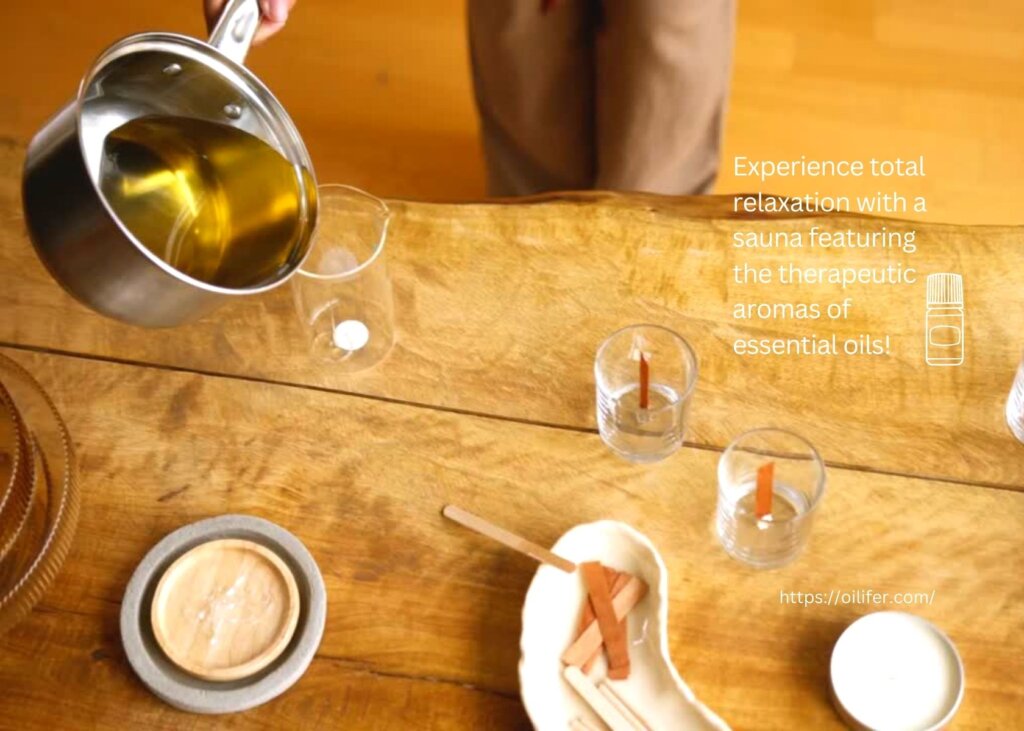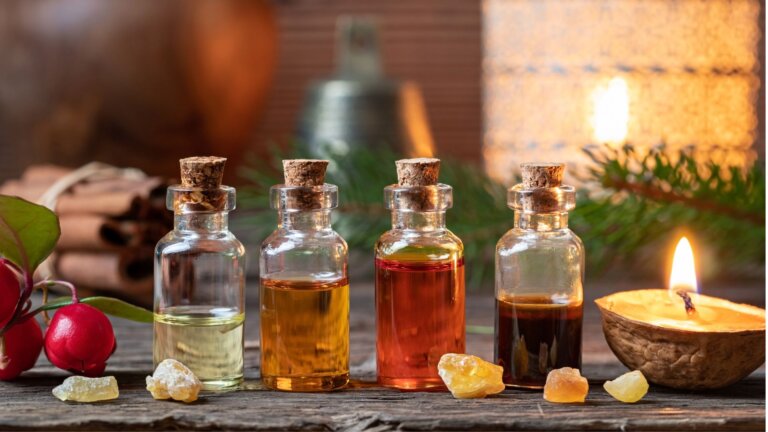What Essential Oils are Good for Sauna
 When it comes to enjoying a sauna session’s calming and healing benefits, adding essential oils can be an excellent way to amplify these effects. Essential oils are highly concentrated liquids that are derived from plants. They offer many benefits in a sauna, including improved relaxation, better mental clarity and focus, enhanced skin health, improved immunity and circulation, and more.
When it comes to enjoying a sauna session’s calming and healing benefits, adding essential oils can be an excellent way to amplify these effects. Essential oils are highly concentrated liquids that are derived from plants. They offer many benefits in a sauna, including improved relaxation, better mental clarity and focus, enhanced skin health, improved immunity and circulation, and more.
Incorporating essential oils contain a variety of compounds with unique therapeutic properties. No matter which essential oils are used, it’s important to ensure they are specifically formulated in a sauna.
Certain oils can release toxic fumes when subjected to high temperatures, so buying your favorite essential oils specially designed for saunas is best. Each of these has specific benefits that can be enjoyed when used in a sauna.
How To Use Essential Oils in Sauna?
Contents
- How To Use Essential Oils in Sauna?
- Best Essential Oils for Sauna Aromatherapy
- 1. Eucalyptus essential oil
- 2.Birch essentail oil
- 3. Lavender essential oil
- 4. Citrus essential oil
- 5. Peppermint essential oil
- 6. Cinnamon essential oil
- 7. Tea Tree
- 8. Bergamot
- 9. Chamomile
- 10. Frankincense essential oil
- 11. Pine essential oil
- 12. Sandalwood essential oil
- Takeaways
- Frequently Asked Questions:
- Can I use essential oils in the sauna?
- Can you use an oil diffuser in a sauna?
- Should I apply oil before the sauna?
- What do you put on your skin in a sauna?
- What kind of oil do you use in a sauna?
- Is the sauna good for my skin?
- Can you put oil on your body in a sauna?
- Can I use essential oils in the portable sauna?
- How do I add eucalyptus oil to my sauna?
- Does eucalyptus oil clean lungs?
Using your favorite essential oil in a sauna with intense aromas can be a truly therapeutic experience with the proper safety precautions. Adding just a few drops of quality sauna essential oils to your sauna can benefit from condensed vaporized molecules of the oil that are absorbed quickly, allowing you to reap the benefits each oil offers.
The best way to apply an essential oil in a sauna is by diffusing it via an evaporator or a diffuser explicitly made for steam distillation and not for fragrance, as this will help provide aroma therapy.
When doing this, it is important to remember not to confuse essential oils with fragrance oils as there are differences between them, such as purity and composition, so always read your labels carefully before use. With these techniques, you can quickly bring your aromatherapy experience into your sauna!
Best Essential Oils for Sauna Aromatherapy

1. Eucalyptus essential oil
Utilizing eucalyptus oil in sauna aromatherapy can provide health benefits and relaxation. Its refreshing properties can leave you feeling alert, focused and less stressed, while its stimulating effects also give an added energy boost and many health benefits. The health benefits of eucalyptus essential oil, such as clarity and focus, are effective ways to create a tranquil atmosphere for health.
2.Birch essentail oil
Birch essential oil has a crisp and refreshing scent and it can be used aromatically in several ways. It helps open the sinuses, increases circulation, speeds up detoxification, reduces pain and inflammation, and helps alleviate congestion. This versatility makes birch oil an excellent choice for aromatherapy purposes. It can also help reduce feelings of stress and tension from day-to-day living as well as physical discomfort from workouts or other activities.
3. Lavender essential oil
Lavender essential oil is a popular oil due to its therapeutic effects. Lavender helps relieve tension and encourages calmness while providing a pleasant scent throughout the sauna. Its antibacterial properties make it ideal for neutralizing odors and reducing airborne bacteria that could cause illness or discomfort.
4. Citrus essential oil
Citrus essential oil is the perfect ingredient to rejuvenate and reenergize whenever you need a quick boost. It has been known to promote overall well-being throughout the day, making citrus oil great if you’ve had a tough day at work.
Citrus-based oils such as orange and grapefruit are top-notch for their calming property due to the high levels of d-limonene it contains. Inhaling these fragrant citrus aromas can help minimize anxiety and lighten your mood.
5. Peppermint essential oil
Peppermint essential oil is a popular choice for sauna users seeking relaxing aromatherapy. Its natural properties can also help to decongest the airways, remove mucus from the respiratory system, and prevent bacterial growth and fatigue.
6. Cinnamon essential oil
Cinnamon is often referred to as the “spice of life,” so it stands to reason that it has this positive effect. Its antiseptic properties help fight off bacteria and improve mental health. All in all, using cinnamon during your sauna sessions gives you a rich scent and enhanced well-being. Additionally, it eliminates germs from sauna air – making it one of the best essential oils for anti-inflammatory properties.
7. Tea Tree
Tea Tree oil has antiseptic and antifungal properties, which help fight infection, making it perfect to use in a damp and warm environment like a sauna. It also serves as a natural expectorant, helping flush out toxins and aid respiratory issues aggravated by steam.
Not only does tea tree oil help keep your skin moisturized, but it can also use for athlete’s foot
and keep your head clear while you relax.
8. Bergamot
Bergamot essential oil has been used for centuries in sauna aromatherapy and is known for its ability to soothe tension and promote relaxation. Its sweet, citrusy scent creates a tranquil environment perfect for letting go of stress.
Bergamot is also credited with uplifting one’s spirits, which can provide some healing while melting away your troubles.
9. Chamomile
Chamomile is one of the best essential oils to use in a sauna since it helps to reduce anxiety and tension while providing relaxation. It’s known for its calming and cooling effects on the body.
As a result, chamomile can help soothe headaches and muscle pain over time, allowing you to enjoy your sauna session without any worries or aches.
10. Frankincense essential oil
Essential oils for sauna aromatherapy can significantly enhance your relaxation experience. Releasing its warm and soothing scent, Frankincense essential oil is the perfect choice to reduce stress and tension. It also alleviates headaches, soothes sore muscles, and boosts circulation!
11. Pine essential oil
A pine essential oil sauna can be incredibly soothing and therapeutic. Diffusing pine oil in your sauna can help reduce joint pain, promote relaxation, improve sleep quality and calm skin.
You only need a few drops of pine oil to achieve maximum benefits. It has an additional promoting effect, as pine essential oils can help with muscle tension relief and calming feelings of anxiety.
12. Sandalwood essential oil
It is a popular essential oil that can boost moods, relieve congestion from colds and seasonal allergies, and even reduce stress levels – making it an excellent choice for those looking for more than just an enjoyable scent.
Takeaways
In conclusion, adding essential oils to your sauna experience can help amplify its benefits. Whether you’re looking for stress relief or pain management, each type of oil brings something unique to the table.
From soothing chamomile to uplifting bergamot, plenty of options are available to suit your needs perfectly. So make sure to incorporate one (or several!) of these essential oils for sauna aromatherapy to make your next session extra special.
Frequently Asked Questions:
Can I use essential oils in the sauna?
A few drops of essential oils in the sauna can create a unique and enjoyable sauna experience. It adds a pleasant aroma to the steam, and many essential oils also have healing properties that can help you relax a little more during your session.
Care should be taken when using essential oils in a hot environment due to their powerful concentration of volatile compounds.
Can you use an oil diffuser in a sauna?
An oil diffuser can be used in a sauna to provide a refreshing, calming effect. All you need is a few drops of your favorite essential oil and some purified water poured into the humidifier’s water tank, which typically sits between two heated sauna rocks.
Should I apply oil before the sauna?
Moisturizing your skin is important if you’re considering entering a sauna. If you don’t already have one, it’s a must-have part of preparing for a sauna session.
Applying a refreshing oil may help to reduce heat loss during your session and add another layer of hydration to prevent dehydrated skin afterward.
What do you put on your skin in a sauna?
When you go to a sauna, you should always ensure you put something on your skin. That is essential oil because it protects the body against excessive heat and helps reduce the risks of burning or dehydration. It’s best to opt for natural oils such as coconut or jojoba oil, which will help nourish and protect.
What kind of oil do you use in a sauna?
Many people choose eucalyptus oil when using a sauna, as it produces a refreshing aroma and can benefit respiratory health. Its soothing properties enhance relaxation, allowing you to take full advantage of the sauna’s therapeutic benefits.
Is the sauna good for my skin?
Saunas are a great way to relax and benefit your skin. Heating the blood vessels boosts blood circulation and encourages toxins to expel from the body, making it refreshing and invigorating.
Moreover, the warm environment is excellent for relieving stress, which often manifests on our faces as puffiness, wrinkles, redness and more.
Can you put oil on your body in a sauna?
Applying oil to your body before entering a sauna can be a great way to provide dry skin conditions with some nourishing relief. The sauna opens up your skin’s pores to replenish moisture and boost mood, but the added nutrients from the oils will help give even better results than going dry.
Can I use essential oils in the portable sauna?
Essential oils are the perfect way to enhance your portable sauna experience for various reasons. Add your favored oil to the small container of water that passes through the steamer and directly apply it to the hot stones used in many portable saunas. Sure to bring your sauna sessions to the next level.
How do I add eucalyptus oil to my sauna?
Adding eucalyptus oil to your sauna is a great way to take it to the next level and enjoy a new experience. Its unique and refreshing scent can help you relax, reduce tension, and increase energy levels.
Does eucalyptus oil clean lungs?
Everyone wants to know if eucalyptus oil can help reduce congestion and clean the lungs. The answer is yes! Inhaling has been shown to reduce congestion and improve breathing.
It can reduce inflammation, decreasing symptoms of agitating respiratory conditions such as bronchitis, asthma, and sinusitis.






